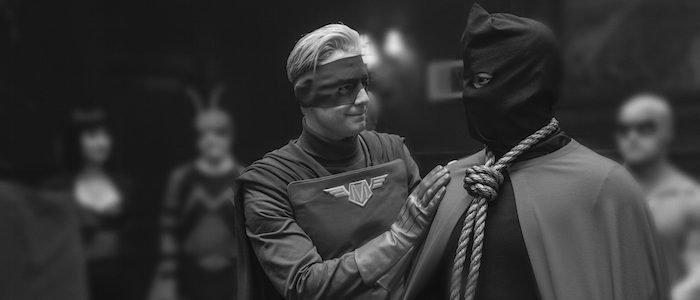
Damon Lindelof wasn’t lying when he said his version of Watchmen was a “remix” of the original graphic novel. Part sequel, part prequel, and also part retcon, the show has surpassed every single expectation you probably had going in. With this latest episode, told primarily through flashbacks, the original superhero team known as the Minutemen finally get their due, as we see the origin of the very first costumed vigilante: Hooded Justice.
Of course, there’s still a ton of references and nods to the source material. So join us, won’t you? Let’s look at all the references to the original Watchmen and more in “This Extraordinary Being.” As always, this will be spoiler-heavy.
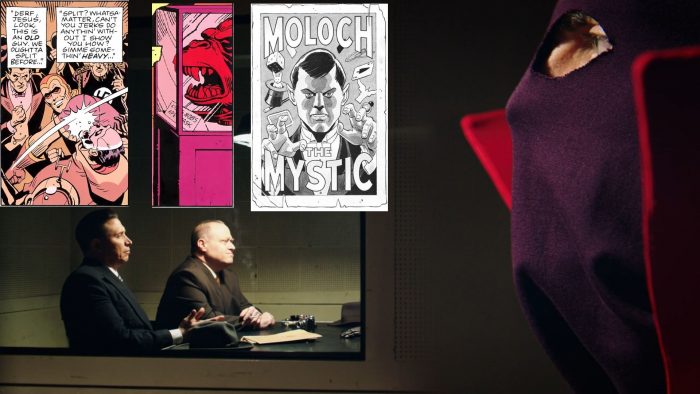
Captain Axis, King Mob and Moloch
The episode starts with yet another “American Hero Story” segment, which – as we now know – is pure fantasy. During an interrogation with the FBI, two agents tell Hooded Justice about the supervillains he helped put away – just before trying to blackmail him into erasing evidence that J. Edgar Hoover was gay. The villains they mention are Captain Axis, King Mob and Moloch.
Out of the three, only Moloch made an actual appearance in the graphic novel – he was a stage magician-turned criminal. The other two are barely mentioned. Captain Axis is briefly mentioned and appears as a hallucination, while we only see the mask worn by King Mob.
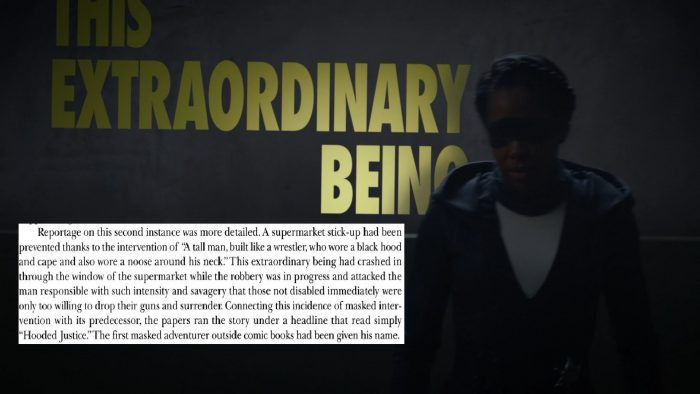
An Extraordinary Being Indeed
The title for this week’s episode, “This Extraordinary Being” comes from a line in the in-universe tell-all autobiography “Under The Hood” by the first Nite Owl, Hollis Mason. Excepts from this book appear throughout the original Watchmen.
The quote comes from one of the first chapters of the book, in which Nite Owl recounts how the superhero fad began, noting that Hooded Justice was first, and writing about his first two crime-fighting incidents. We saw both of them in this episode. The first incident was Hooded Justice stopping the mugging in the alleyway, while the second was an incident in a grocery store. Now, we now see how both actually played out. In the book, Nite Owl quotes a newspaper clip about the grocery store incident, which describes Hooded Justice as an “extraordinary being.”
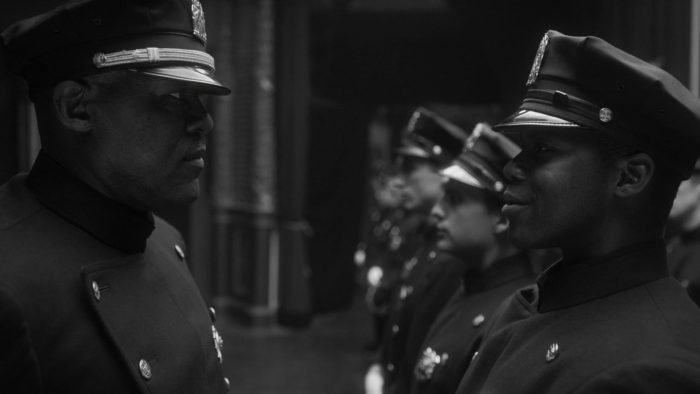
Lt. Samuel J. Battle
When we see Will Reeves graduating as a New York City police officer, he is sworn in and welcomed by one Lieutenant Battle, who Will mentions was his inspiration to join the force. Samuel J. Battle was not only a real person, but the first black police officer in New York City.
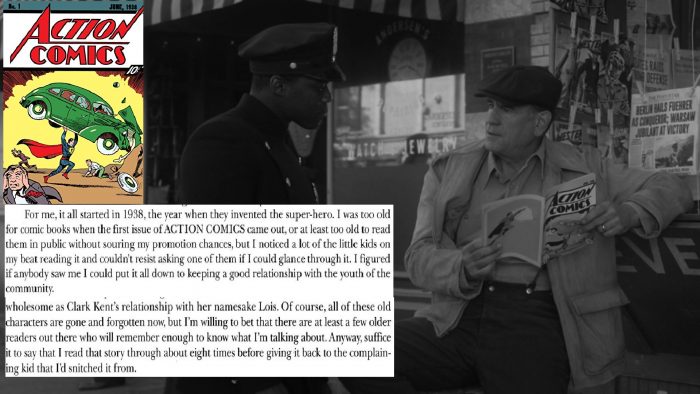
Action Comics
We see Will talking to a newsstand salesman who shows him the newest comic book sensation: the first issue of Action Comics, better known as the debut of Superman. In the first issue of the graphic novel, via an excerpt from “Under The Hood,” Nite Owl recounts how Superman served as inspiration for his career as a costumed crime-fighter.
Sadly, as real vigilantes started becoming an everyday thing in this world, reading fake stories about fictional superheroes became less popular. Eventually, Superman was all-but-forgotten.
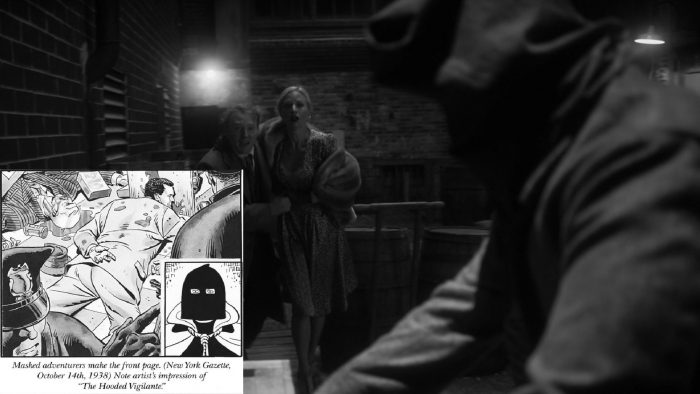
Saving the Couple
After a horrifying scene where Will is nearly lynched, we see the birth of a hero. Will hears a woman screaming, which prompts him to help a couple that is being mugged in an alleyway. This, of course, is a recreation of his first appearance as recounted in the story-within-a-story “Under The Hood” from the original comic, where this incident is written as the first sighting of Hooded Justice.
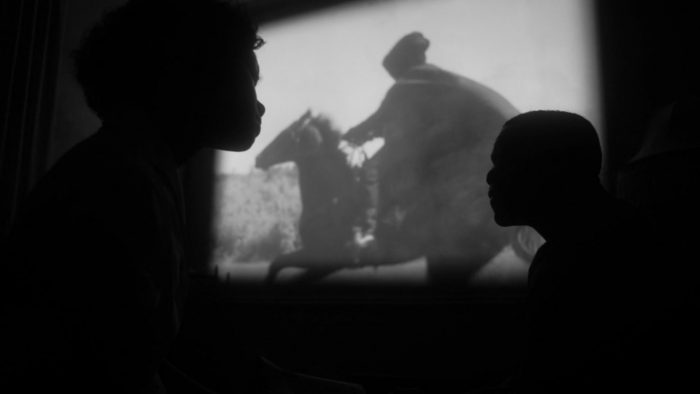
Bass Reeves and Hooded Justice
Will based his Hooded Justice costumed persona on the silent film about Bass Reeves he was watching in the first scene of the first episode, titled Trust in the Law. Of course, the film’s version of Bass Reeves was against mob justice, instead telling the townsfolk to trust in the law. Meanwhile, Will is becoming a hooded vigilante because he’s realizing that he can’t trust the law.
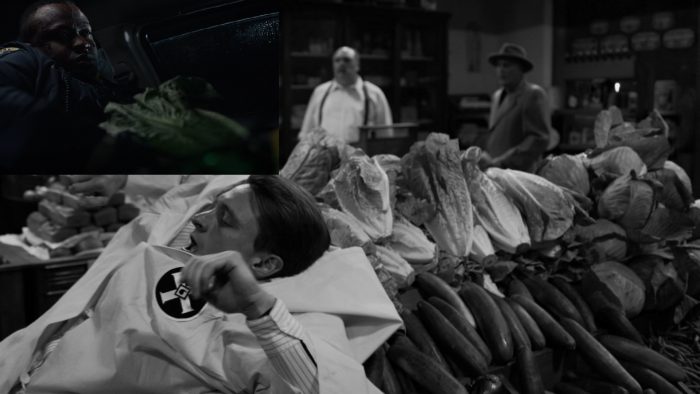
Racists and Lettuce
This may be a coincidence, but with the amount of detail we’ve seen in this show so far, we’re choosing to believe it was deliberate. When Hooded Justice has his first fight with the KKK (or Cyclops), he throws one of them into a lettuce stand in a grocery store. This brings to mind the scene in the first episode where the member of the Seventh Kavalry throws a lettuce at the body of a dead police officer.
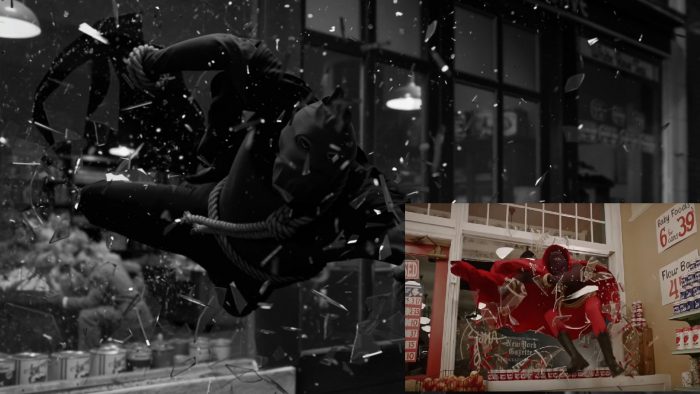
Superheroes and Windows
A big part of the episode deals with appropriation and erasure. Will appropriates the tools that were nearly used to kill him, and uses them to become a symbol of justice, while Captain Metropolis and the rest of the vigilantes appropriate his work to become heroes themselves. Likewise, we see how the story of Will was distorted and erased over the years, first by Nite Owl’s “Under The Hood” book, and then by “American Hero Story.”
Just like we later see, it was Captain Metropolis idea to have sex wearing masks and to have Hooded Justice always in costume in front of the Minutemen. Even the moment where Hooded Justice breaks through a convenience store window plays out very differently than what we saw in “American Hero Story” all the way back in episode two.
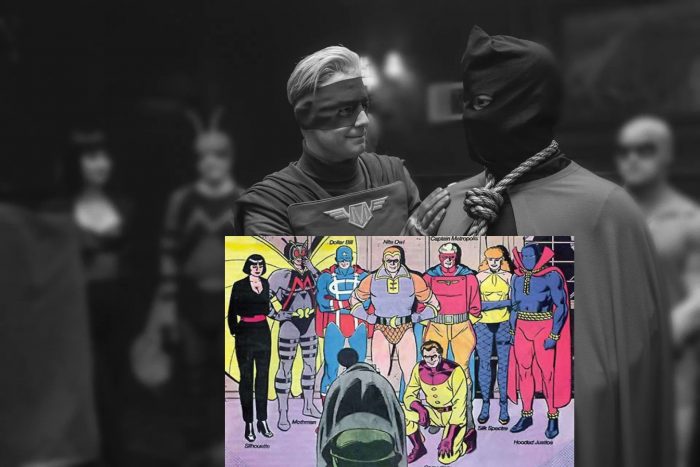
The New Minutemen
The group shot of the New Minutemen, with all their members present, is a recurring image in the Watchmen graphic novel. The comic uses it to show a glimpse of the good old days and how bad things have turned since those “glory days.” Like they did with the squid attack last week, this episode finds a clever way of showing what probably was the moment the photo was taken, but from a different perspective.
Even if we don’t see the costumes very clearly, there’s enough for audiences to instantly recognize Moth Man’s bug imagery, Dollar Bill’s symbol, Nite Owl’s mask, and even Silhouette, Silk Spectre and The Comedian’s outfits. Of course, the characters are lined up in the same order as in the group photo from the comic.
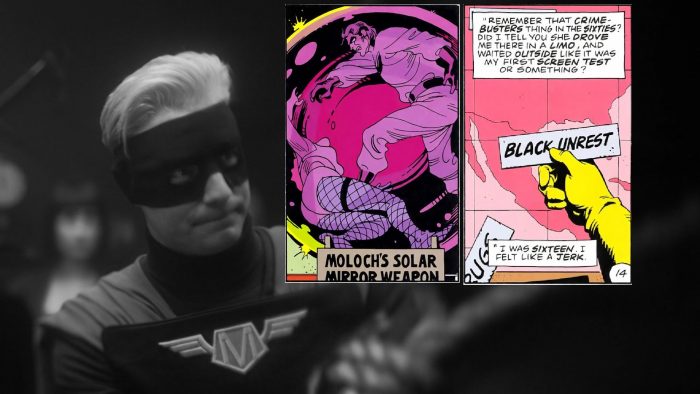
Captain Metropolis, Moloch and “Black Unrest”
During the first Minutemen meeting, Captain Metropolis dismisses Will’s attempts to get attention for the “vast and insidious conspiracy” by instead introducing a plot by the villain Moloch to harvest the power of the sun – which looks like a more “fitting” mission for the Minutemen.
Later, when Will asks Metropolis for help, he telsl Will “I’m afraid you’re going to have to solve ‘black unrest’ all on your own.” A couple of decades later, Captain Metropolis will see “black unrest” as one of the biggest threats to the country, as seen during the first meeting of his failed superhero group the Crimebusters.
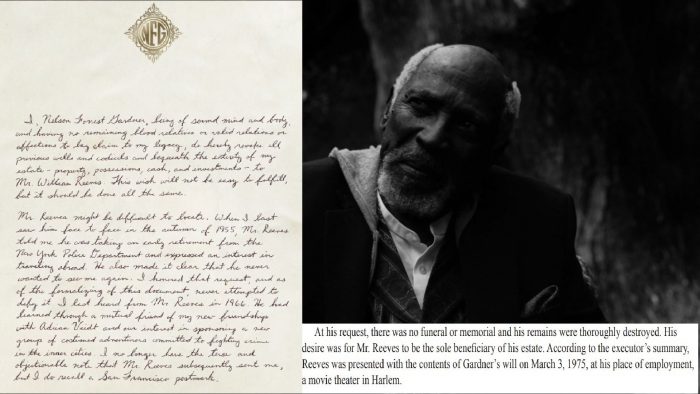
Will Inherited Captain Metropolis’ Entire Estate
As seen in this week’s Peteypedia files (the online-only “documents” that add further detail to the show’s world), the will and testament of Nelson Gardner, AKA Captain Metropolis, sees him repent for not treating Will’s fight against the KKK seriously. The will states that Gardner left everything he owned to Will, including the very profitable license to the Minutemen. Does this mean Will is both rich and also somehow behind “American Hero Story”? Also of note is the bit where it says that Will Reeves retired from the police force to operate a movie theater in Harlem during the 1970s. Did he keep the mesmerizing projector while at work?
The post The ‘Watchmen’ Reference Guide: Every Easter Egg in “This Extraordinary Being” appeared first on /Film.
from /Film https://ift.tt/2KPT4ny
via IFTTT
Comments
Post a Comment